#Dictionaries Printing
Explore tagged Tumblr posts
Text
Dictionaries | Just Printoholics

In the heart of Naraina, Delhi, where the power of words meets the art of precision, Just Printoholics stands tall as the go-to destination for dictionaries printing. Dictionaries, those repositories of language and knowledge, are not just books; they are a testament to the mastery of printing. In this blog post, we'll delve into the world of dictionaries printing, explore the offerings of Just Printoholics, and understand why they are recognized as the epitome of the best printing in Delhi.
Dictionaries Printing: An Art and a Science
Dictionaries are more than just collections of words; they are gateways to language, knowledge, and understanding. Printing dictionaries requires a delicate balance of art and science, and Just Printoholics has mastered this balance to perfection.
The process of dictionaries printing involves intricate typesetting, careful selection of fonts, and precise printing to ensure legibility and clarity. Just Printoholics understands the importance of every word, every definition, and every detail. Their commitment to excellence is evident in the crispness of the printed text, the durability of the pages, and the overall aesthetics of the finished product.
Printing Company in Naraina: Just Printoholics
Situated in the bustling locale of Naraina, Just Printoholics has emerged as a printing powerhouse, offering a diverse range of printing services. From business cards to banners, they have become synonymous with quality and reliability. However, it is in the realm of dictionaries printing that Just Printoholics truly shines.
As a printing company in Naraina, Just Printoholics has not only kept pace with the evolving printing landscape but has also set new standards. Their dedication to delivering top-notch products has earned them the trust of clients seeking excellence in every print. The artistry of dictionaries printing is not just a service for Just Printoholics; it's a craft they have honed to perfection.
Best Printing in Delhi: A Distinction Well Earned
In a city as dynamic and diverse as Delhi, the demand for the best printing services is insatiable. Just Printoholics has risen to the occasion, earning the title of the best printing in Delhi through their unwavering commitment to quality and customer satisfaction.
Dictionaries, being essential tools for education and reference, require a level of precision that only the best printing in Delhi can provide. Just Printoholics' state-of-the-art printing facilities and a team of skilled professionals ensure that each dictionary they produce meets the highest standards of quality. It's not just about printing words; it's about creating an experience for the reader.
Crafting Words with Just Printoholics
The dictionaries printing process at Just Printoholics begins with a meticulous selection of materials. From the choice of paper to the ink quality, every element is chosen with the end-user in mind. The printing experts at Just Printoholics understand that a dictionary is not merely a book; it's a companion that guides, educates, and enlightens.
The typesetting process is where the magic happens. Just Printoholics employs cutting-edge technology to ensure that each word is rendered with precision and clarity. The fonts are chosen not just for their aesthetic appeal but also for their readability. The result is a dictionary that doesn't just contain information; it presents it in a visually pleasing and easily accessible manner.
#Dictionaries Printing#Just Printoholics#Printing Company in Naraina#Best Printing in Delhi#Precision Printing#Printing Craftsmanship#Language and Knowledge#Printing Excellence#Quality Printing
0 notes
Text
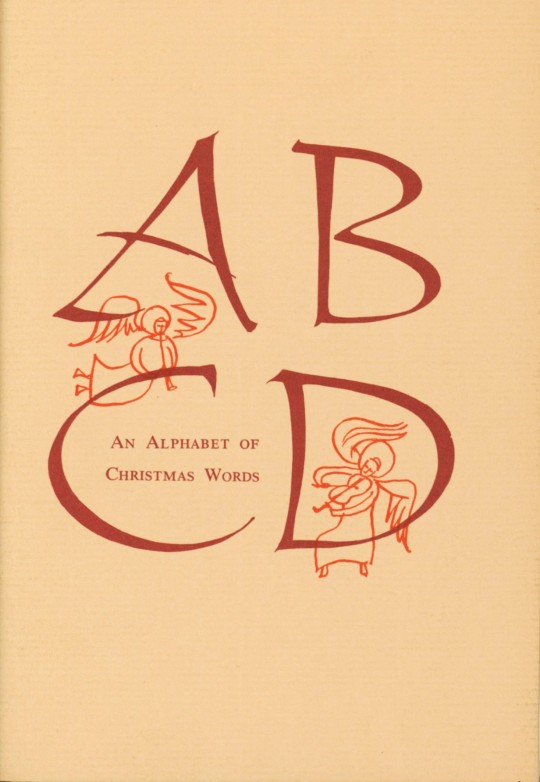
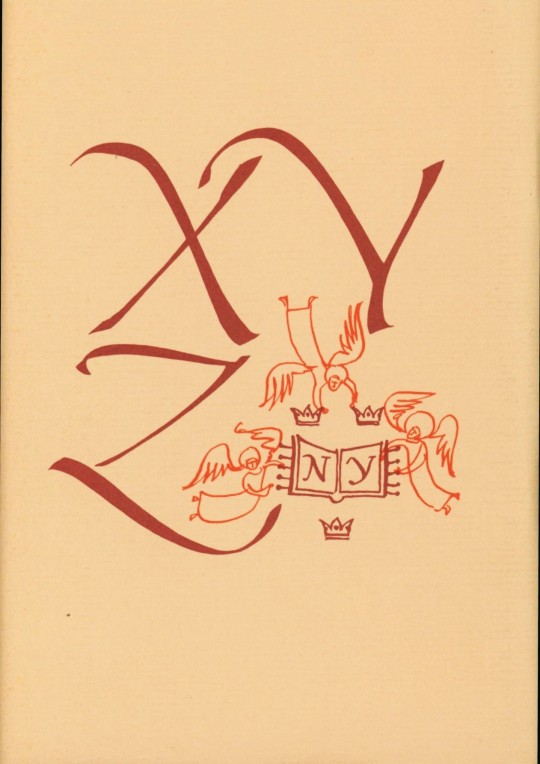

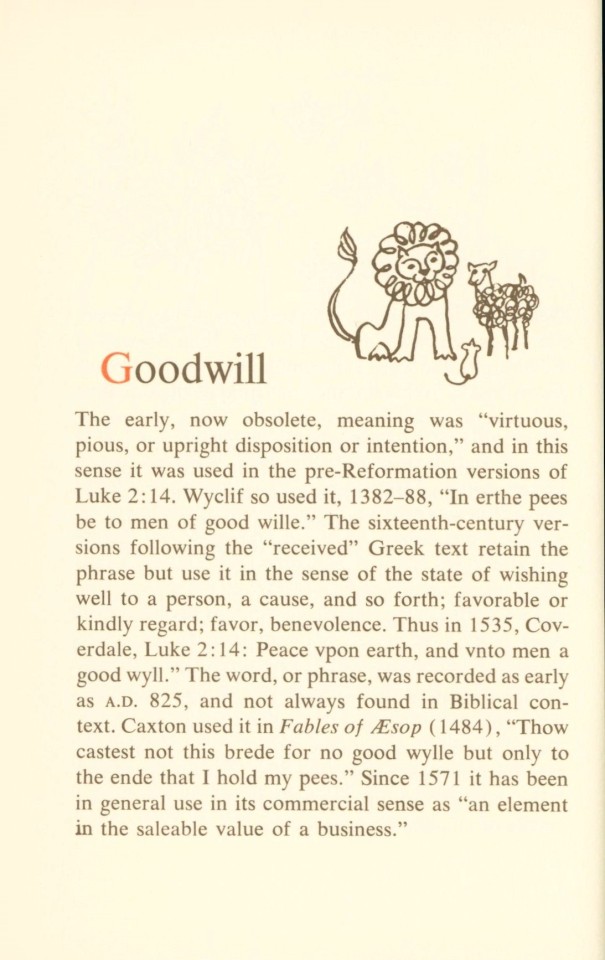



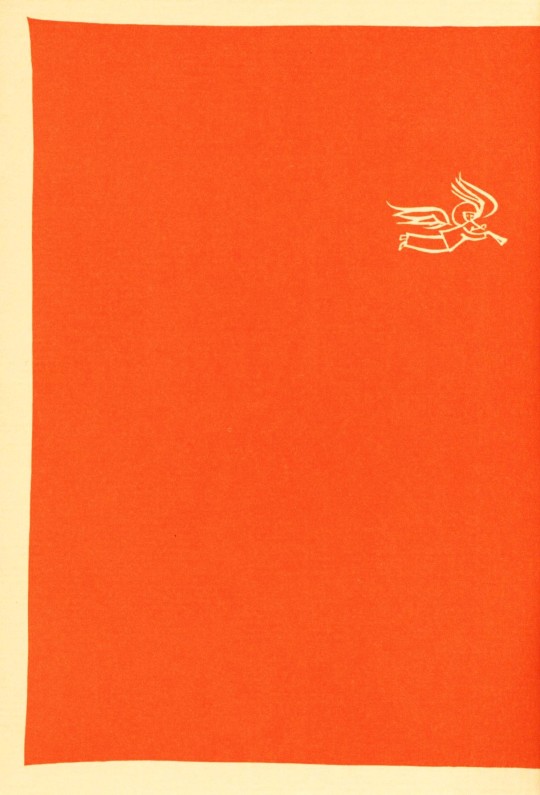
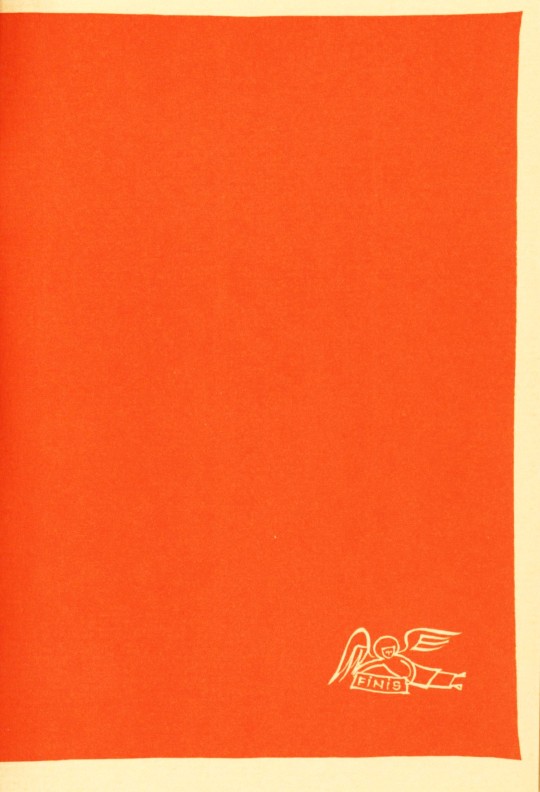
It’s Fine Press Friday!
In the spirit of Christmas’s arrival in three days, we present a small Christmas-themed book entitled An Alphabet of Christmas Words, published in 1966. The book is a dictionary of holiday terms, with corresponding illustrations. Entries were selected and edited from the Oxford English Dictionary by American writer Helen McKelvey Oakley (1906-2003), who explains that her “interest [in this project] lies in seeing how The Dictionary treats [each term].” The accompanying illustrations are by Ursula Suess (b. 1924), a graphic designer, calligrapher, and artist. Most recently, her art was shown in a 2022 solo exhibition at the Tubac Center of the Arts in Tubac, Arizona.
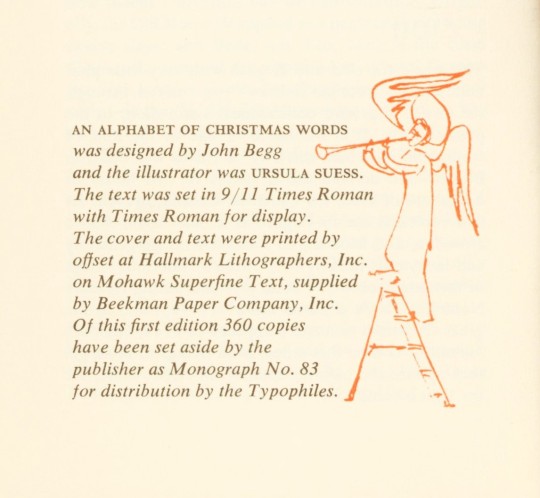
An Alphabet of Christmas Words was offset printed in Times Roman on Mohawk Superfine Text paper by Hallmark Lithographers Inc. in an edition of 360 copies, published by the Oxford University Press and designed by Ursula Suess and the press's art director and vice president John Begg (1903-1974). Also included with this book are two small season’s greetings cards from the press; one has Begg’s name printed on it and the other has “from Ursel and Mutti” inscribed in black ink.
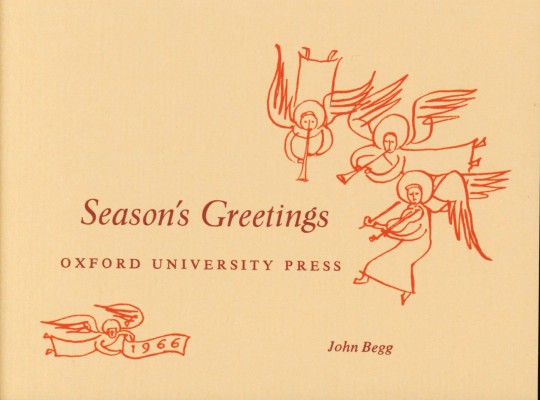
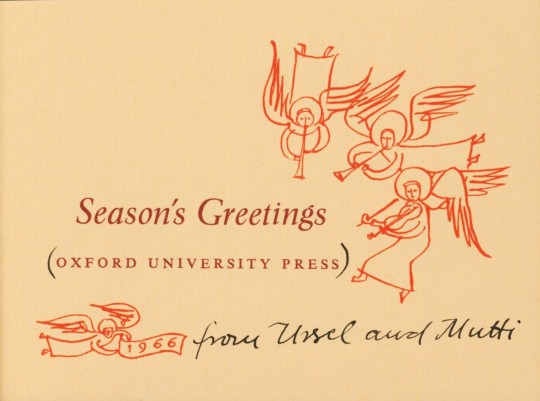
View more Fine Press Friday Posts.
– Sarah S., Special Collections Graduate Intern
#Fine Press Friday#fine press fridays#fine press printing#fine press books#An Alphabet of Christmas Words#Christmas#oxford dictionary#oxford english dictionary#helen mckelvey oakley#ursula suess#John Begg#Times Roman#Mohawk superfine paper#offset printing#Hallmark Lithographers#typophiles#alphabet#Sarah S.
58 notes
·
View notes
Text





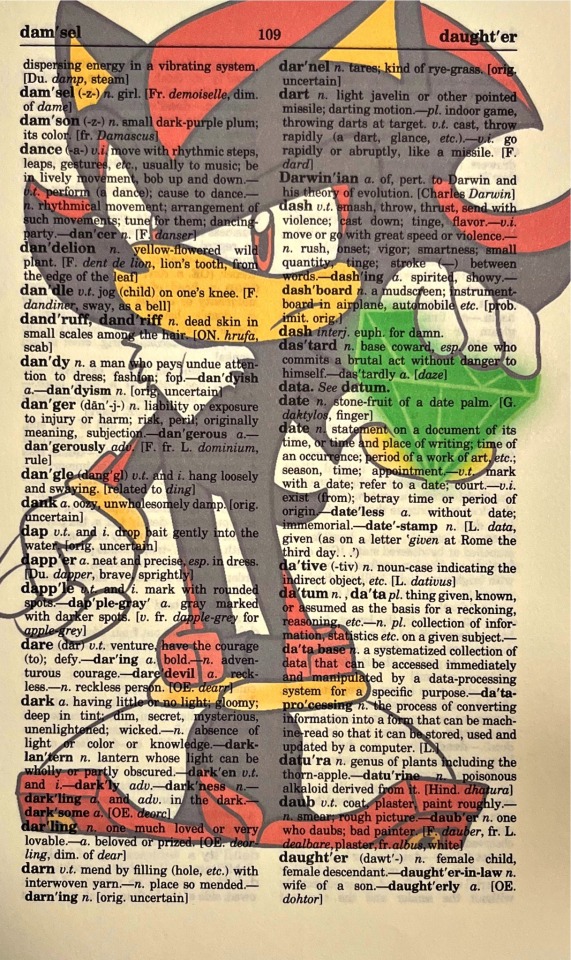




“Artful Words on Dictionary Page”
These are a few of the Dictionary Prints I’ve made for my business! Stay tuned, there's more on the way! Which one is your favorite?
#dictionary#art prints#artists on tumblr#stitch disney#cookie monster#shadow hedgehog#super sonic#support artists#cartoon art#fanart#illustration#prints#the avengers#bluey heeler#sheldon j plankton#godzilla#sorcerer mickey#mickey mouse#winnie the pooh#disney#sega#marvel#nickelodeon#sesame street#sonic the hedgehog#lilo and stitch
28 notes
·
View notes
Text
Everytime I have to discern what the fuck the doctor meant by an abbreviation, I briefly think abt the twitter users I saw at each other's throats for using BPD to mean borderline personality disorder OR bipolar disorder like the acronym would run out of uses and wonder what they'd think if they saw even one page of the Stedman's Medical Abbreviation dictionary
#Creepy chatter#We used to be civilized. We used to have Medilexicon. WE USED TO HAVE MEDILEXICON.#Now we just have like rigid print resources for the most part#Medilexicon was a web-based medical thesaurus/dictionary/acronym database#That would show how common each reported use of a certain abbreviation was#It was so nice when trying to figure out if a doctor was just. Making up their own shit. 🤦#PAF I hate you so much#Anyway the owners couldn't support the cost of servers anymore and shut it down god like 6 or so years ago?#Guaranteed to have a bonding moment w any other professional when you mourn Medilexicon. We ALL miss her.#Library of Alexandria moment :'(
37 notes
·
View notes
Text
Google Translate is so weird nowadays. No, I didn't mean that word, I didn't misspelled it, no, it's still in Hungarian, don't change the language to Turkish! Just say that you don't know or there is no exact translation and I have to paraphrase, dammit
megilletődik -> "deserved" -> no, that's megillet, or megérdemel
megszeppen -> "beautify" -> no, that's megszépít!
kirítt -> "laid out" -> what??? that's kiterített or lefektetett, how did you even...?
#tonhal pofázik#sztaki for my rescue#i'm going to get the printed dictionary from home#enshittification
10 notes
·
View notes
Text

#me#mine#exam week day 1 outfit#bought a dictionary and it feels like a defeat but i need to learn how to put my ego aside and just accept my french is not perfect (yet)#the dictionary was printed in 1988#xix century art history about to kick my ass today
10 notes
·
View notes
Text
k babes reblog and tell me about the books on your nightstand (or wherever you stack books by your bed if you don't have a nightstand) what are they why are they there etc
#currently I have a copy of Jane Eyre full of colourful flag tabs I'm referencing for Jane Eyre Monster Hunter#House of Leaves which I forgot I was properly reading this time#the remnants of a stack I put there a while back bc I didn't know what book I'd feel like in the morning which includes:#circe by madeleine miller and glenarvon by caro lamb and wild magic by tamora pierce#also twilight in French and Spanish paired with 501 French Verbs 501 Spanish Verbs a Spanish dictionary and a Spanish thesaurus#which I forgot I was working through to try to nail down verb tenses#I'm getting good at the conditional vs subjunctive varieties in Spanish but French verb tenses are so absurd#also a little handbound book of poetry we wrote during The Trauma Days(tm) which I just printed and bound this weekend#it probably isn't great poetry but it has some banger lines and typesetting it triggered me so it's absolutely accomplishing it's intent#(I mean triggering me wasn't the goal but capturing the absolute surreal helpless ragey horrible fascinating experience was)#(and if it triggered me I'd say it did that)#oh and the sparrow on my other table which I've read half of and then I thought it was about to get More Sad and chickened out#and haven't steeled myself to finish yet
3 notes
·
View notes
Text

and if i said this was from rhaenicent
#im having fun in here actually. if you cant get tragidoomed dykes modern au creating sentences god couldnt make is fine#etxt#what im really chasing is. the other day i was skimming a zukka au where sokka was explaining bisexuality to azula#like full on Actually you can like men and women. it's called bisexuality. it's a thing. and the quote was. its so good.#'sounds like you can't make up your mind' said azula dismissively.#horseshoe fic theory. it either has to be literature or it has to drop full on dictionary lgbt definitions to be good#this literally rules daemon cut his hair short to be a hashtag ally bc he works w alicent who would mistake him for rhaenyra and get mopey#bc they broke up .#DOUBLE UPDATE this literally rules rhaenyra met an alicent fangirl who grows up to be a Queer Artist tabling at comic con who credits alice#for her figuring out she was a lesbian and rhaenyra pays her 500 dollars for a print and attracts a crowd so she sells out of prints
9 notes
·
View notes
Text
Today has been a day, tell you what
#textpost#I inked a little bit of the Dizzy print but it's been kind of crazy irl and I keep having to stop#Think I'm gonna call it for today and see if I can work on translations instead. Don't need as steady a hand for that#Been considering maybe cracking open one of the 4koma volumes to translate on the side#Don't need to wrangle my braincells into as coherent a coordination for those#I can almost read the any of the 4koma cover to cover without needing a dictionary#Not gonna track my progress on the 4koma if I start doing it though. They don't really feel like a project that 'needs' to be done#Just something I'll surprise do and whip out there whenever I feel like it
9 notes
·
View notes
Text
maybe if i knew german i'd know what was going on. or maybe not! who knows!
#sophies ramblings#no one uses accents in prints from this time#and it makes it a LOT HARDER to look up words bc most of the german dictionaries are very sensitive#not to mention gothic type is a nightmare to read#wurgung doesn't exist in any of the dictionaries i've found and it MIGHT be würgunge but it's a weird description of what's happening
2 notes
·
View notes
Text

It’s been a whole year since this iconic move was made by yours truly 🤧 😂
#greta van fleet#josh kiszka#juckle#iconic#urban dictionary#I laughed making this then and I laugh looking back at it now#I need this printed onto a mug rn
4 notes
·
View notes
Text










“Artful Words on Dictionary Page”
Here are more of the Dictionary Art Prints I’ve made for my business! Which one is your favorite?
#felix the cat#mickey mouse runaway brain#the smurfs#riff raff#the underdog show#epic mickey#mickey mouse#hocus pocus#m&ms#m&m candy#football#sonic the hedgehog#artists on tumblr#drawing#cartoon art#illustration#bussiness woman#dictionary#art prints#its the great pumpkin charlie brown#spooky season#the princess and the frog#princess tiana#tianas bayou adventure#support artists#walt disney#peanuts comics#runaway brain#happy halloweeeeeeen#halloween
16 notes
·
View notes
Text
i have... a penchant... for getting really into books which are out of print. not cause they’re like first editions or collectibles or whatever the fuck (i went to an antique book show recently and was SO pissed there was like 50 Alice in Wonderlands, but no 1900 printed french books you couldn’t even find in pdfs online... in fact, no foreign language books at all what the fuck :c... and 2 gone with the winds, 50 lord of the rings... like i get it, the target audience of an antique show is maybe? idk people collecting expensive books? but for me? the point was to find out of print old books that may never have been digitized. thank the universe for archive.org there’s so many 1800s learn japanese, 1900s learn chinese books with different versions of romanization and then later different amounts of character simplification, theres the ‘nature method’ textbooks that i’ve only seen back in print very recently and only for a few languages and probably only cause nerds like me can’t shut up about them, there’s so many BOOKS i’m into that just... :c good fucking luck finding them if not for the kind efforts of archivists or random chance)
#rant#like. god even kamikaze girls??? a RECENT novel. a novel with a MOVIE#and its like... seems to have only had one print run or whatever#u can find it used. sometimes. thats it#and like ive been trying to find novalas other novels? hhaha i cant even find them used. they're out of stock.#and then like. there's this AMAZING japanese book called Japanese in 40 Hours.#a HERO made a video series of the chapters on youtube i recommend looking at it. and its on archive.org thank fuck#but its basically i think the BEST sparksnotes basic primer for western speakers to begin learning japanese#its quick. it gives a solid foundation of grammar and word endings before throwing u into kana. and its faster paced then a LOT of modern#books ive used.#theres a chinese book called Chinese Grammar by the Nature Method.#i believe the author is Thimm. it was published in like 1929. it is all#traditional characters. its like 300 very compact pages. its a very beautiful small book.#it has a HUGE hanzi dictionary in the back. it is THOROUGH in its grammar explanations and SO easy to understand.#its my favorite chinese grammar book by far. and the sheer VOLUME of words in it#make it a good overall book#not just for grammar but also words. the only weird thing is the old romanization system but once u recognize the hanzi u can#match them to modern pinyin you know better. and just? it is SUCH a good book#even with the outdated bits (like NIN used a lot and le pronounced liao in a lot of spots we'd now use le)#and its out of print. its another book i think i found on archive.org then wanted a print copy of
2 notes
·
View notes
Text
My high school had an FAQ page about what the hell the mascot (a zizzer) is, precisely. This logo is all there is; no sentience here.

#not exactly doxxing myself#i have mentioned the flag incident here before#just google “west plains high school flag” and you'll get what the flag incident means. if you care.#plus i don't even live there anymore#For the record all the students thought the mascot was horseshit#Nevermind the fake dictionary definition which is written strangely. They print that on shirts n stuff#my college just has a white guy with a job. but also a gun#because missouri
7K notes
·
View notes
Text
actual writing advice
1. Use the passive voice.
What? What are you talking about, “don’t use the passive voice”? Are you feeling okay? Who told you that? Come on, let’s you and me go to their house and beat them with golf clubs. It’s just grammar. English is full of grammar: you should go ahead and use all of it whenever you want, on account of English is the language you’re writing in.
2. Use adverbs.
Now hang on. What are you even saying to me? Don’t use adverbs? My guy, that is an entire part of speech. That’s, like—that’s gotta be at least 20% of the dictionary. I don’t know who told you not to use adverbs, but you should definitely throw them into the Columbia river.
3. There’s no such thing as “filler”.
Buddy, “filler” is what we called the episodes of Dragon Ball Z where Goku wasn’t blasting Frieza because the anime was in production before Akira Toriyama had written the part where Goku blasts Frieza. Outside of this extremely specific context, “filler” does not exist. Just because a scene wouldn’t make it into the Wikipedia synopsis of your story’s plot doesn’t mean it isn’t important to your story. This is why “plot” and “story” are different words!
4. okay, now that I’ve snared you in my trap—and I know you don’t want to hear this—but orthography actually does kind of matter
First of all, a lot of what you think of as “grammar” is actually orthography. Should I put a comma here? How do I spell this word in this context? These are questions of orthography (which is a fancy Greek word meaning “correct-writing”). In fact, most of the “grammar questions” you’ll see posted online pertain to orthography; this number probably doubles in spaces for writers specifically.
If you’re a native speaker of English, your grammar is probably flawless and unremarkable for the purposes of writing prose. Instead, orthography refers to the set rules governing spelling, punctuation, and whitespace. There are a few things you should know about orthography:
English has no single orthography. You already know spelling and punctuation differ from country to country, but did you know it can even differ from publisher to publisher? Some newspapers will set parenthetical statements apart with em dashes—like this, with no spaces—while others will use slightly shorter dashes – like this, with spaces – to name just one example.
Orthography is boring, and nobody cares about it or knows what it is. For most readers, orthography is “invisible”. Readers pay attention to the words on a page, not the paper itself; in much the same way, readers pay attention to the meaning of a text and not the orthography, which exists only to convey that meaning.
That doesn’t mean it’s not important. Actually, that means it’s of the utmost importance. Because orthography can only be invisible if it meets the reader’s expectations.
You need to learn how to format dialogue into paragraphs. You need to learn when to end a quote with a comma versus a period. You need to learn how to use apostrophes, colons and semicolons. You need to learn these things not so you can win meaningless brownie points from your English teacher for having “Good Grammar”, but so that your prose looks like other prose the reader has consumed.
If you printed a novel on purple paper, you’d have the reader wondering: why purple? Then they’d be focusing on the paper and not the words on it. And you probably don’t want that! So it goes with orthography: whenever you deviate from standard practices, you force the reader to work out in their head whether that deviation was intentional or a mistake. Too much of that can destroy the flow of reading and prevent the reader from getting immersed.
You may chafe at this idea. You may think these “rules” are confusing and arbitrary. You’re correct to think that. They’re made the fuck up! What matters is that they were made the fuck up collaboratively, by thousands of writers over hundreds of years. Whether you like it or not, you are part of that collaboration: you’re not the first person to write prose, and you can’t expect yours to be the first prose your readers have ever read.
That doesn’t mean “never break the rules”, mind you. Once you’ve gotten comfortable with English orthography, then you are free to break it as you please. Knowing what’s expected gives you the power to do unexpected things on purpose. And that’s the really cool shit.
5. You’re allowed to say the boobs were big if the story is about how big the boobs were
Nobody is saying this. Only I am brave enough to say it.
Well, bye!
4K notes
·
View notes
Text
hello, internet user. before you is a selection of pictures you tagged "dark academia." you have 30 minutes to explain what each of them has to do with academia, defined by the Oxford dictionary as "the environment or community concerned with the pursuit of research, education, and scholarship"
if you cannot complete this task a literature professor will enter the room and beat you into unconsciousness with a baseball bat that has the word "GOTHIC" printed on it in large letters
good luck
#dark academia#gothic#so fed up with this nonsense#a dimly-lit Art Deco theatre lobby is not dark academia! Crimson Peak is not dark academia!#WHERE IS THE ACADEMIA. WHERE. POINT TO THE ACADEMIA IN THOSE THINGS#IS THE ACADEMIA IN THE ROOM WITH US NOW
7K notes
·
View notes